
The author and publisher have provided this e-book to you for your personal use only. You may not make this e-book publicly available in any way. Copyright infringement is against the law. If you believe the copy of this e-book you are reading infringes on the authors copyright, please notify the publisher at: us.macmillanusa.com/piracy .
This book is dedicated to my ancestors, the Kennedys of Yonkers, New York.
Hardworking, generous, and honest folks.
Contents
A Note to Readers
N OVEMBER 22, 1963
M INEOLA, N EW Y ORK
A PPROXIMATELY 2:00 P.M.
The students in Brother Carmine Diodatis freshman Religion class were startled. Over the loudspeaker, a radio report crackled into the Chaminade High School classroom. President John F. Kennedy had been shot in Dallas, Texas, and taken to the hospital. A short time later we would all learn he was dead. No one knew what to say.
Most Americans born before 1953 remember exactly where they were when they heard the news that JFK had been assassinated. The days following that terrible Friday were filled with sadness and confusion. Why did it happen? Who really killed the president? What kind of country did we live in anyway?
The assassination of JFK was somewhat personal for me. My maternal grandmother was born Winifred Kennedy, and my Irish-Catholic family had deep emotional ties to the young president and his family. It felt as if someone in my own home had died violently. Like most kids on Long Island, I didnt care much about national politics. But I vividly remember pictures of JFK displayed in the homes of my relatives. To them, he was a saint. To me, he was a distant figure who died in a terrible way, his brain splattered all over the trunk of a car. The vision of his wife, Jacqueline, crawling onto the back of the limo in order to retrieve the presidents shattered skull has stayed with me always.
* * *
Martin Dugard and I were well pleased that millions of people read and enjoyed Killing Lincoln . We want to make history accessible to everyone. We want to tell readers exactly what happened and why, using a style that is entertaining as well as informative. After chronicling the last days of Abraham Lincoln, the progression to John Kennedy was a natural.
It has been widely pointed out that the two men had much in common. In fact, the parallels are amazing:

Lincoln was first elected in 1860, Kennedy in 1960.

Both were assassinated on a Friday, in the presence of their wives.

Their successors were both southerners named Johnson who had served in the Senate.

Andrew Johnson was born in 1808, Lyndon Johnson in 1908.

Lincoln was elected to Congress in 1846, while Kennedy was elected to the House in 1946.

Both men suffered the death of children while in office.

The assassin Booth shot inside a theater and fled into a storage facility, while the assassin Oswald shot from a storage facility and fled into a theater.
Back in 1963, few Americans understood how profoundly the assassination of JFK would change the country. These days, history is a difficult thing to impart, especially because of political agendas. In this book, we will try to cut through the fog and bring you the facts. Unfortunately, some of the facts are still not known. In our narrative, Martin Dugard and I go only as far as the evidence takes us. We are not conspiracy guys, although we do raise some questions about what is unknown and inconsistent.
However, before you proceed further, please know that this is a fact-based book and some of what you will read has never before been publicly stated.
The truth about President Kennedy is sometimes gallant, and sometimes disturbing. The truth about how and why he was murdered is simply atrocious. But all Americans should know the story.
Its all here in this book. It is my special privilege to bring it to you.
B ILL OR EILLY May 2012 Long Island, New York

MAY 29, 1917NOVEMBER 22, 1963
Prologue
J ANUARY 20, 1961
W ASHINGTON, D . C .
12:51 P.M.
The man with fewer than three years to live has his left hand on the Bible.
Chief Justice Earl Warren stands before him reciting the Presidential Oath of Office. Do you, John Fitzgerald Kennedy, do solemnly swear
I, John Fitzgerald Kennedy, do solemnly swear, the new president repeats in a clipped Boston accent. His gaze is directed at the jurist whose name will one day be synonymous with Kennedys own death.
The new president, born into wealth, has a refined manner of speaking that would seem to distance him from the electorate. But he is an enthusiastic and easily likeable mans man. He joked openly about his fathers vast riches during the campaign, defusing that divisive issue with humor and candor so that average Americans would trust him when he spoke about making America better. Poor men in West Virginia heard a man from Boston say he needed their help, and they gave it. In the alien corn of Nebraska, with a familiar chopping motion of his right hand, he explained that America can be great-ah, and the farmers knew what he meant, one writer noted of Kennedys broad appeal.
But not everyone loves JFK. He won the popular vote over Richard Nixon by a razor-thin margin, garnering just 49 percent of the tally. Those farmers might have known what Kennedy meant, but 62 percent of Nebraskans voted for Nixon.
That you will faithfully execute the office of President of the United States.
That I will faithfully execute the office of President of the United States
Eighty million Americans are watching the inauguration on television. Twenty thousand more are there in person. Eight inches of thick, wet snow have fallen on Washington, D.C., overnight. The army had to use flamethrowers to clear the roads. The sun now shines on the Capitol Building, but a brutal wind strafes the crowd. Spectators wrap their bodies in sleeping bags, blankets, thick sweaters, and winter coatsanything to stay warm.
But John Kennedy ignores the cold. He has even removed his overcoat. At age forty-three, JFK exudes fearlessness and vigor. His lack of coat, top hat, scarf, or gloves is an intentional ploy to burnish his athletic image. He is trim and just a shade over six feet tall, with greenish-gray eyes, a dazzling smile, and a deep tan, thanks to a recent vacation at his familys Palm Beach home. But while JFK looks like the picture of health, his medical history has been troubling. Kennedy has already been administered the last rites of the Roman Catholic Church on two separate occasions. His medical woes will continue to trouble him in the years to come.
And will, to the best of your ability
And will, to the best of my ability
In the sea of dignitaries and friends arrayed all around him, there are three people vital to Kennedy. The first is his younger brother and reluctant choice for attorney general, Bobby. The president values him more for his honesty as an adviser than for his legal ability. He knows Bobby will always tell him the truth, no matter how brutal it may be.
Next page
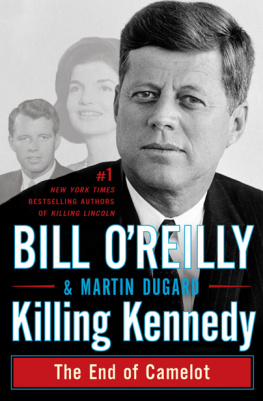
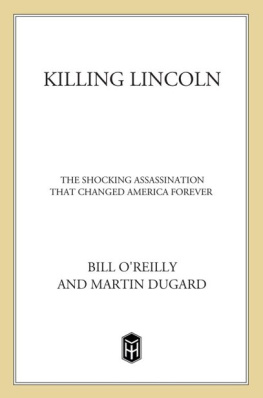
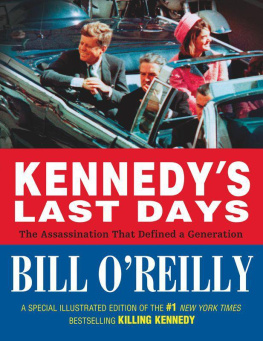
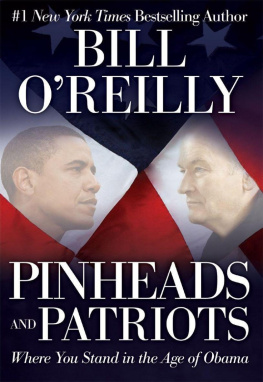
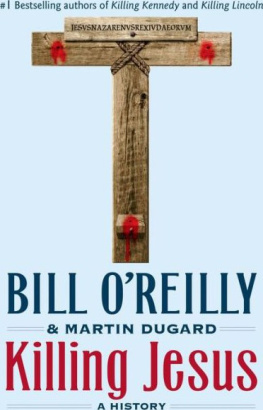
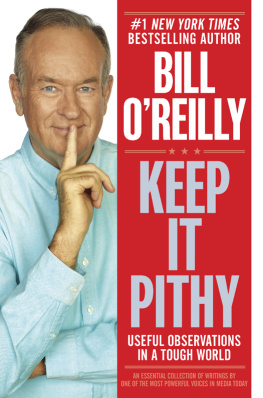
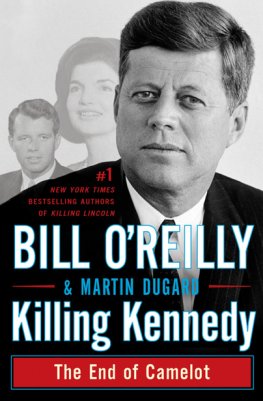
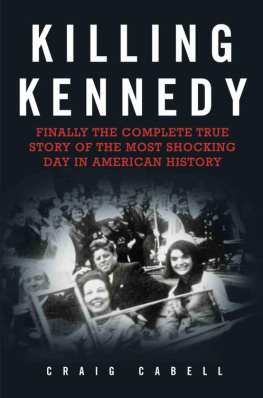

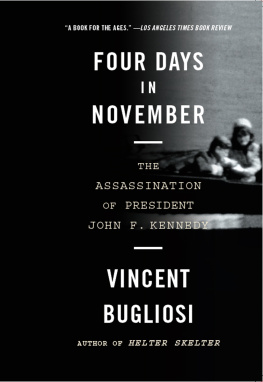
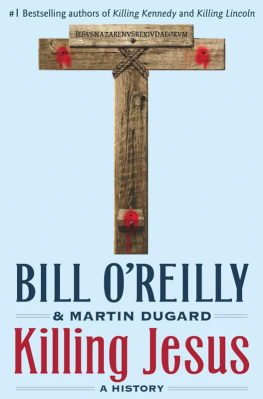
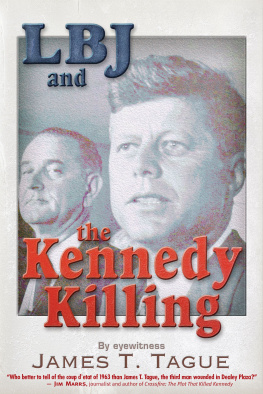
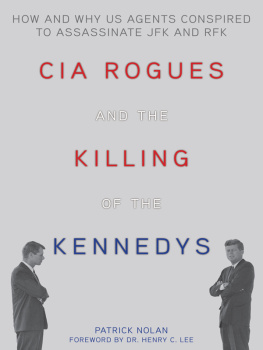

 Lincoln was first elected in 1860, Kennedy in 1960.
Lincoln was first elected in 1860, Kennedy in 1960.